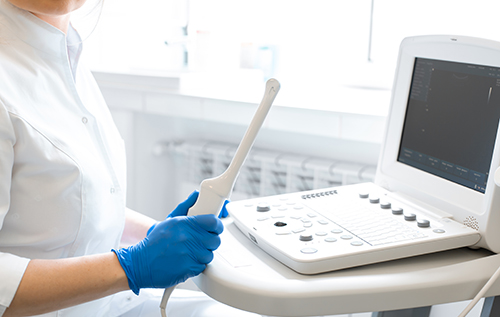Gynaecological ultrasound at Tees Hospital
- Overview
- What is an ultrasound?
- How will I know if I need a gynaecological ultrasound?
- How can I book a gynaecological ultrasound?
- How should I prepare for a gynaecological ultrasound?
- What happens during an ultrasound?
- How long does a gynaecological ultrasound take?
- Is a gynaecological ultrasound safe?
- How/when will I receive my results?
- Location
- Ways to pay
- Contact us
Or call us on
A Gynaecological ultrasound is often used to examine conditions affecting the organs in a woman's pelvis - the uterus, fallopian tubes and ovaries.
What is an ultrasound?
An ultrasound is a scan used to monitor and diagnose conditions in many parts of the body, without the use of radiation. An ultrasound scan uses high-frequency sound waves to produce images of the interior of the body.
How will I know if I need a gynaecological ultrasound?
If you require an ultrasound, your healthcare professional will refer you. A gynaecological ultrasound is often used to examine conditions affecting the organs in a woman’s pelvis, the uterus, fallopian tubes, and ovaries.
Some of our hospitals also offer Hysterosalpingo Contrast Sonography (HyCoSy) and alternative ovarian screening options.
How can I book a gynaecological ultrasound?
To book an ultrasound, you will need a referral from a healthcare professional. If you have an outpatient consultation with a Nuffield Health consultant, they will refer you for a scan if clinically appropriate. You can also use a referral from your own GP or alternative healthcare professional, just email your referral to your chosen Nuffield Health hospital and a member of the team will call you back.
How should I prepare for a gynaecological ultrasound?
If you are having your pelvis scanned, you will be asked to attend the appointment with a full bladder. This acts as an ultrasound window and allows better visualisation of the pelvic organs. There will be a toilet nearby so you can empty your bladder immediately after the scan. Please ensure that you thoroughly read any preparation instructions sent to you prior to your appointment.
What happens during an ultrasound?

Depending on the specific area being scanned, there are two different types of scans you may have:
- External – a clear, cool gel is spread on the area to be scanned the probe is moved back and forth over the area being scanned. You may be asked to take deep breaths or to move into different positions for different images.
- Internal – to check for abnormalities such as polyps, cysts, and fibroids and assess your ovaries or uterus, a small probe is inserted into the vagina.
The sound waves bounce off internal organs and are passed back through the probe to a computer. The computer turns these sound waves into highly detailed images in real time, shown on the monitor.
An ultrasound scan is painless, but depending on the type of ultrasound, there may be some slight discomfort. A consultant radiologist will perform the scan and a healthcare assistant will be in the room to support you and the consultant.
How long does a gynaecological ultrasound take?
The appointment will usually take around 20 minutes, however, this will vary depending on the specific type of scan you have.
Is a gynaecological ultrasound safe?
Ultrasound scanning is not dangerous and has no known side effects, it is used during pregnancy.
How/when will I receive my results?
Your results will be verified by a Radiologist and sent to your referring healthcare professional within a week of your appointment. Times may vary for specialist examinations, so we recommend checking with the hospital team before you leave. Your referrer may recommend a follow-up appointment to discuss your results.
Click here for other types of ultrasound scanning
Junction Road, Norton, Stockton on Tees, TS20 1PX
Ways to pay
Nuffield Health promise
Our prices are all-inclusive. We will equal any comparable price. There are no time limits on your aftercare.
Paying for yourself
There are no hidden costs in our treatment prices. The price you see is the price you pay.
Find out morePersonal medical loan
Spread the cost of your treatment with a 6, 10 or 12 month 0% personal medical loan.
Find out moreMedical insurance
We work with you and your insurance provider to get you the treatment you need quickly
Find out more